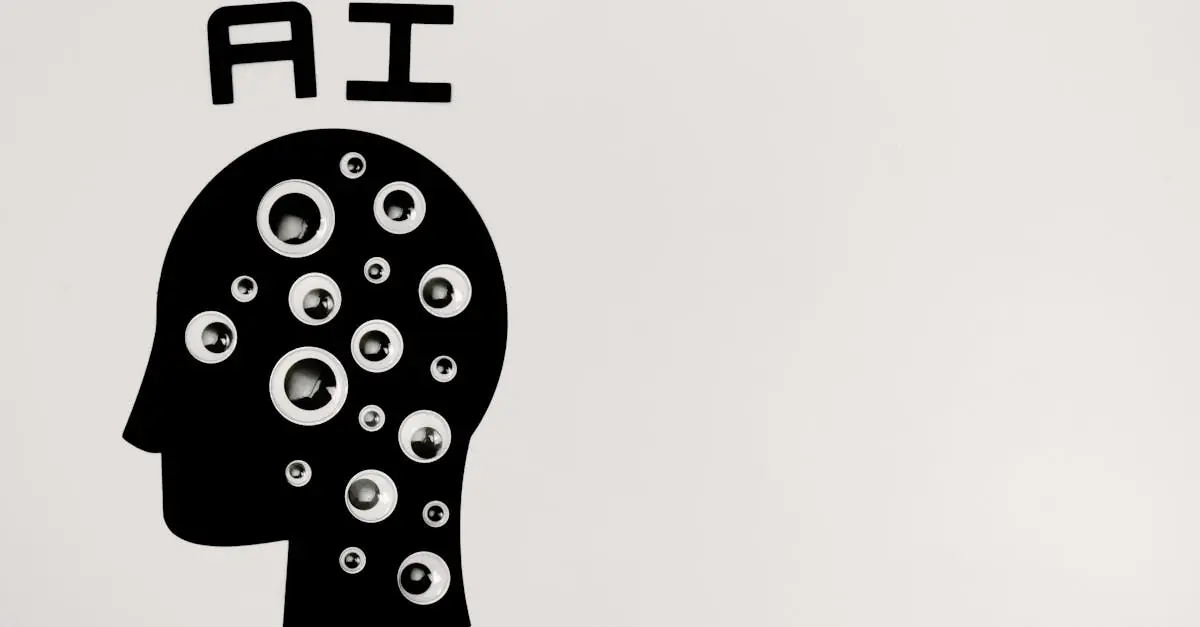In a world where robots might just steal your lunch and your heart, “A.I. Artificial Intelligence” dives into the quirky yet profound relationship between humans and machines. This cinematic gem, directed by the legendary Steven Spielberg, explores themes of love, loss, and what it really means to be human—while keeping viewers on the edge of their seats, wondering if their smart fridge is plotting against them.
Imagine a future where your best friend is a highly advanced robot who’s programmed to love you unconditionally. Sounds dreamy, right? But as the story unfolds, it raises questions that could make even the most tech-savvy among us ponder: What happens when artificial intelligence becomes too real? Buckle up for a thought-provoking journey that’s equal parts heartwarming and mind-bending, proving that sometimes the most human stories come from the most unexpected places.
Table of Contents
ToggleOverview of A.I. Artificial Intelligence Full Movie
“A.I. Artificial Intelligence” presents a futuristic narrative where humans and robots coexist. Directed by Steven Spielberg, this film delves into themes such as love, loss, and the essence of humanity.
The story follows David, a highly advanced robot created to love unconditionally. David’s journey highlights emotional connections between humans and machines, making audiences question the true nature of love. Throughout the film, viewers witness the tragic results of rejection and loneliness that David experiences.
Notably, the movie features impressive special effects and a captivating screenplay. Each scene builds tension and provokes thought about the growing role of technology in society. Spectators encounter a range of characters that demonstrate various human responses to artificial beings.
In addition, the film interweaves moments of humor alongside its emotional depth. This approach adds contrast, ensuring that the narrative remains engaging. The film’s cinematography enhances the storytelling, providing a stunning visual representation of a future where technology blurs the lines between human and machine.
Critically acclaimed, “A.I. Artificial Intelligence” remains relevant as it prompts conversations about the ethical implications of artificial intelligence. This movie not only engages audiences emotionally; it also encourages them to reflect on their relationships with technology. Through its intricately woven tapestry of themes, the film invites viewers to explore what it truly means to love and be loved.
Plot Summary
“A.I. Artificial Intelligence,” directed by Steven Spielberg, delves into the intricate dynamics between humans and robots. The story follows David, an advanced robotic boy created to love unconditionally, leading viewers to ponder the boundaries of artificial intelligence.
Key Characters
David serves as the heart of the film, bringing depth to the story with his quest for acceptance. His adoptive mother, Monica, embodies the human struggle between love and obligation. Henry, David’s father, represents skepticism towards technology’s role. The character of Professor Hobby provides insight into the implications of creating sentient beings. Lastly, the Mecha characters illustrate the varying responses to David’s existence.
Major Themes
Love surfaces as a central theme, showcasing its complexities across human-robot relationships. Loss becomes evident through David’s experiences, highlighting the emotional toll of rejection. Humanity’s essence challenges viewers, as they consider what it means to be human. The ethical implications of artificial intelligence provoke critical thought, as technology advances beyond its intended purpose. Humor interspersed throughout the film adds levity while reinforcing these deeper messages.
Cinematic Elements
Cinematic elements play a significant role in shaping the impact of “A.I. Artificial Intelligence.” They enhance the narrative, ultimately engaging viewers on multiple levels.
Direction and Production
Steven Spielberg’s direction emphasizes emotional depth throughout the film. His vision combines science fiction with poignant storytelling, capturing the viewer’s attention. Producers Kathleen Kennedy and Bonnie Curtis ensure that the film marries innovative technology with a heartfelt narrative. The collaboration among talented professionals creates an immersive experience, enhancing the film’s exploration of complex themes. Notably, Spielberg’s approach to pacing and character development invites audiences to connect deeply with David’s journey.
Visual Effects and Cinematography
Visual effects significantly contribute to the film’s atmosphere and storytelling. A blend of practical effects and CGI creates stunning visuals that bring the futuristic world to life. Cinematographer Janusz Kamiński uses lighting and composition to convey emotional intensity, supporting the film’s themes. Each scene is crafted with careful attention to detail, highlighting the delicate interplay between human and artificial characters. The integration of advanced techniques allows viewers to fully experience the emotional weight of David’s quest for acceptance.
Critical Reception
“A.I. Artificial Intelligence” received mixed reviews upon its release in 2001. Critics praised the film’s ambitious themes and emotional depth. Spielberg’s direction drew attention for blending science fiction with poignant storytelling.
Rotten Tomatoes shows a 75% approval rating based on 233 reviews. The film’s visual effects earned acclaim for their innovative approach. Special effects artist Douglas Trumbull contributed significantly to the film’s unique visual landscape.
On Metacritic, it holds a score of 62, indicating mixed or average reviews. Roger Ebert awarded it three out of four stars, noting both its emotional weight and its philosophical aspirations. He emphasized the thought-provoking nature of the film’s exploration of human-robot relationships.
Listeners often engage with the soundtrack composed by John Williams, which complements the film’s emotional narrative. The score received nominations for both the Academy Awards and the Golden Globes.
While some viewers found the pacing slow and narrative challenging, others appreciated the film’s explorations of love and loss. Audience reactions varied, with many finding David’s journey relatable and haunting.
Overall, the film’s ambitious themes sparked discussions about the future of artificial intelligence and its implications on human relationships. “A.I. Artificial Intelligence” remains a focal point in conversations about the intersection of technology and humanity.
Final Thoughts
The film “A.I. Artificial Intelligence” invites viewers to ponder the implications of artificial intelligence in a compelling way. David’s journey underscores the complex emotional landscape that arises between humans and machines. Characters like Monica and Henry illustrate the blend of love and skepticism, which reflects contemporary concerns about technology.
Exploration of themes stands out prominently throughout the film. Love remains central, shaping interactions and decisions, while loss illustrates the pain of rejection. Humanity’s essence and its moral complexities emerge as significant topics for audience reflection. Ethical discussions around the creation of sentient beings drive home the importance of mindful technological advancement.
Spielberg’s direction enhances the narrative with emotional depth that resonates strongly. Cinematographer Janusz Kamiński employs lighting and composition skillfully, crafting visually striking moments that amplify the emotional stakes. The innovative blend of practical effects with CGI brings the story’s futuristic elements to life, creating a breathtaking visual experience.
The critical reception of the film, marked by a 75% approval rating on Rotten Tomatoes, indicates its lasting impact despite mixed reviews. Critics have acknowledged its thought-provoking narrative and emotional richness, complementing the strengths of the visual effects and John Williams’ evocative soundtrack. Many have found that the film remains relevant, as it continues to stimulate vital conversations about the future of artificial intelligence and human relationships.
“A.I. Artificial Intelligence” offers a rich tapestry of themes, characters, and cinematic artistry. The film challenges perceptions and encourages a deeper understanding of the emotional dynamics between humans and AI. Its exploration of love, loss, and humanity ensures it remains a focal point in discussions about technology’s role in society.
“A.I. Artificial Intelligence” stands as a significant exploration of the intricate relationship between humans and technology. Through David’s poignant journey, the film delves into profound themes of love and loss that resonate deeply with audiences. Spielberg’s masterful direction and the stunning visuals crafted by Kamiński create an immersive experience that captivates viewers.
The film’s ability to spark critical conversations about the ethical implications of artificial intelligence ensures its relevance in today’s rapidly advancing technological landscape. As audiences reflect on the emotional depths presented, they are encouraged to consider the future of human-robot interactions. Ultimately, “A.I. Artificial Intelligence” remains a thought-provoking cinematic achievement that challenges perceptions and invites meaningful dialogue about the essence of humanity in an increasingly automated world.



